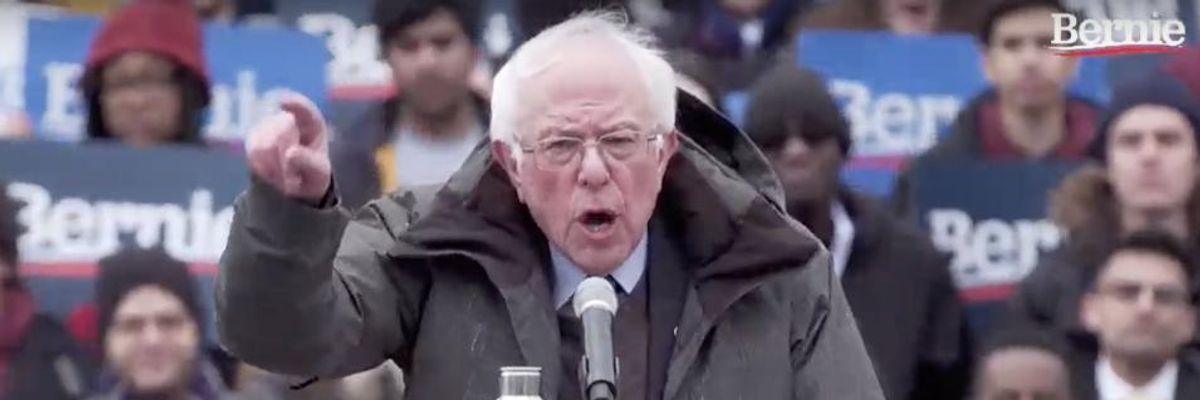Sen. Bernie Sanders (I-Vt.) kicked off the first rally of his 2020 presidential campaign on Saturday at Brooklyn College, where he spoke about not only the political revolution driving his second run for the White House, but also how his childhood in New York City shaped his politics.
"My experience as a child, living in a family that struggled economically, powerfully influenced my life and my values. I know where I came from, and that is something I will never forget."
--Sen. Bernie Sanders
"My experience as a child, living in a family that struggled economically, powerfully influenced my life and my values. I know where I came from, and that is something I will never forget," he declared, addressing a crowd just a few miles from the rent-controlled apartment where he was raised.
The candidate compared his experiences growing up as the son of a Jewish immigrant, attending public schools, and receiving an allowance of 25 cents a week, with those of President Donald Trump. As Sanders said, "Unlike Donald Trump, who shut down the government and left 800,000 federal employees without income to pay their bills, I know what it's like to be in a family that lives paycheck-to-paycheck."
"I did not have a father who gave me millions of dollars to build luxury skyscrapers, casinos, and country clubs. I did not come from a family that gave me a $200,000 allowance every year beginning at the age of three," he noted. "But I had something more valuable. I had the role model of a father who had unbelievable courage in journeying across an ocean with no money in his pocket to start a new and better life."
Bolstered by recollections from his youth, Sanders outlined the key tenets of his presidential platform, and emphasized his desire to, with the help of his supporters, "transform this country and finally create an economy and a government which works for all of us, not just the one percent."
"The principles of our government will be based on justice--on economic justice, on social justice, on racial justice, on environmental justice," he said.
"The principles of our government will be based on justice--on economic justice, on social justice, on racial justice, on environmental justice."
--Sanders
The revolution that Sanders and his supporters seek, as the candidate detailed in his speech, requires standing up to Wall Street, the fossil fuel industry, the pharmaceutical companies, and so many other special interests who use money to influence American politics.
Sanders called for pursuing Medicare for All to guarantee healthcare as a right for every American as well as policies to ensure a $15-per-hour federal hourly minimum wage, affordable childcare, and tuition-free public college.
He also called for ending wars abroad, addressing the student debt crisis, expanding Social Security, reforming the criminal justice system, strengthening gun safety laws, safeguarding reproductive rights, transforming the national energy system away from fossil fuels, closing tax loopholes created to benefit billionaires, and rebuilding infrastructure across the country.
Decrying Trump's cruel immigration policies, Sanders also demanded comprehensive immigration reform that includes a path to citizenship for Deferred Action for Childhood Arrivals (DACA) recipients and a humane border policy that treats asylum seekers with dignity, rather than ripping children out of their parents' arms.
As the crowd chanted "Bernie, Bernie, Bernie," the senator responded, "No, no, no, it is not 'Bernie.' It is you. It's us, together," alluding to his campaign slogan, "Not Me. Us." He thanked the attendees "for being part of a political revolution which is going to transform America."
"We're gonna win this election because we are putting together the strongest grassroots campaign in the history of American politics."
--Sanders
"Brothers and sisters, we are going to win this election not because we have a super PAC funded by billionaires," Sanders concluded. "We're gonna win this election because we are putting together the strongest grassroots campaign in the history of American politics."
The rally also featured speeches from Jane Sanders, the senator's wife and founder of the Sanders Institute; Scott Slawson, president of UE Local 506, whose workers are currently waging the largest manufacturing strike of the Trump era; Rev. Terry Alexander, a Democratic state representative from South Carolina; Ohio state Sen. Nina Turner (D), former president of Our Revolution; and journalist and activist Shaun King.
King spoke at length about Sanders' long history of advocating for human rights and racial justice in the United States. He noted that after studying for a year at Brooklyn College, Sanders transferred to the University of Chicago in 1960 and became heavily involved in local organizing for the Civil Rights Movement.
While Sanders often has not highlighted his history as a civil rights activist during his previous political campaigns, it seems to be emerging as an early focal point of this one.
After the rally in Brooklyn, Sanders is scheduled to visit Selma, Alabama on Sunday to mark the anniversary of "Bloody Sunday," when police officers beat civil rights protesters as they tried to cross the Edmund Pettus Bridge in 1965. After that, Sanders heads to Chicago for a Sunday night rally at Navy Pier.
Watch the Brooklyn rally (Bernie Sanders' speech begins at 44:00):

